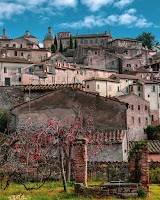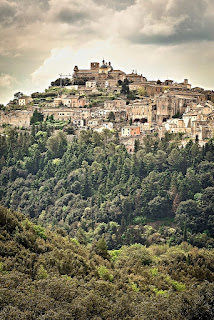By Edgar Tijhuis
This year, the ARCA Postgraduate Program in Art Crime and Cultural Heritage Protection will be held from May 28 through August 12, 2020 in the beautiful heart of Umbria in Amelia, Italy.
In the months leading up to the start of the program, this year’s lecturers will be interviewed. This week I meet professor Marc Balcells, one of the world’s leading scholars on art crime.
Can you tell us something about your background and work?
I am a professor at the Open
University of Catalonia (UOC) and an associate professor at Pompeu Fabra University
(UPF). I teach criminology and criminal law. I hold degrees in Criminology, Law
and Human Sciences, as well as a Masters in Criminal Law and Criminal Justice.
I also hold a PhD in Criminal Justice. My research focuses mostly around
transnational and organized crime, mostly related to cultural heritage crime,
among other topics in criminology that I am researching as we speak, such as
sexual abuse in the church and cybercrime.
What do you feel is most
relevant about your course?
The course changed
drastically last edition. Before, it was all about criminological theory applied to
cultural heritage crime. But I felt a responsibility with my students regarding
teaching them how to design and conduct good research in this field, always within a
criminological angle. That is, instead of piling up information on any given
art crime that will probably be collected from books and newspapers, the course gives participants tools to conduct serious quantitative
or qualitative research and learn how to design a research project within the
field of cultural heritage crime. Challenging participants to see what serious
research they are able to conduct in order to improve our knowledge on this
field is essential! And of course, in the meantime participants not only learn
about cultural heritage crime but also about criminology and criminological
theory, using other crimes as examples of crime in general, as it is one of our
everyday realities that we must live with. Last edition we worked with seminal
articles and books that explored cultural heritage crime: in 2020 we have
more new articles and academic books exploring forgeries, art theft or looting
(to name a few) which are important as they can be used by students to see how
research is being conducted in this field.
 |
| The 2019 class with Marc Balcells.. |
What do you hope
participants will get out of the courses?
A fascination for a criminological
point of view when analyzing cultural heritage crime, as well as an enchantment
with the field of criminology and a fascination for the craft of research.
Again, it is very important to have a knowledge not only about the existing
literature but also on how to produce more research like the one that is being
disseminated in conferences and academic journals and books. I do hope to train
more and more serious and disciplined researchers in this fascinating field.
What would a typical day
be like in your classroom?
A dialogue between myself
and the students. I do ask a lot of questions in order to prompt debate:
getting to know what participants think about on different topics is very
enriching. But I also like to challenge them and to see how they research art
theft, or looting, to name two crimes, by giving them research examples and
seeing how they would improve them or simply do things differently. Gathering
data on cultural heritage crime is not always easy (on the contrary!) and we
researchers struggle finding them: the opinion of the students is always
valuable.
 |
| The Palgrave Handbook on Art Crime.. |
While each year
participants are very enthusiastic about your course, is there anything that
you learn from them in class?
So many things! Go
figure: as I said, over the years I gather brilliant insights from students
that are original and intelligent. Participants must know that before I became
a professor in this degree, I was a student in it: I have sat on both sides of
the classroom and, therefore, I do know what is to be a student and what I
wanted from a professor when I was studying. I am not only a professor on the
ARCA Program but I am a graduate of it!
I am inquisitive by
nature, but much more in class. I love to ask questions and see their points of
view. Also, I do love to meet with the participants after classes and enjoy a
tea with them while chatting about art crime in general or helping them with
their projects.
In anticipation of your course,
what book, article, or movie would you recommend to the participants?
In my case, I would
recommend that they read academic research produced by scholars in whichever
field of cultural heritage crime they are interested in. I can assure you that they
are as fascinating as any other art crime book that is being written by
journalists, for example. Therefore, I would recommend they read everything
that interests them, but mainly within academia. Right now I am reading the
Trafficking Culture’s book Trafficking Culture: New Directions in
Researching the Global Market in Illicit
Antiquities, and Hufnagel and Chappell’s The Palgrave Handbook on
Art Crime, both new additions to academic literature published in 2019.
 |
| Field trips.. |
What makes the annual
ARCA program so unique?
Let’s say it like this:
it is the intensity. Where else can you learn so much, working with top experts
in this field? It is intensive and complete and, at the same time, it immerses
you in the local culture of Amelia! Field trips organized by the program gives
participants the in-depth experience needed to grasp most of the subjects
discussed in the courses. It
is the perfect setting!
Which other course in the
program would you love to follow yourself and why?
So many. Since I was once
an ARCA participant myself, new courses have developed, and I would love,
especially, to attend Professor Christos Tsirogiannis’ course on the hidden
market of illicit antiquities. I admire his work and he is a great colleague.
He was a great help with my earlier research and I could not be more grateful.
He is widely acknowledged as an expert in the field and his media attention and
the scope of his work is simply amazing! Again, it is the living proof of what
I mentioned in my previous answer. Learning all about antiquities trafficking
with Professor Tsirogiannis in Italy is an opportunity not to be missed!
 |
| Amelia... |
Is there anything you can
recommend to future participants of things to do in Amelia or Umbria?
Come with an open and
ready mind. Learn the culture of the place in which you will be living during
your summer there. And be ready to learn a lot: work hard and there can be
fantastic rewards afterwards. It is a fantastic field and it requires more and
more trained minds to work in it!
Are there any funny or
interesting things you experienced in Italy, outside class?
Indeed! We are still good
friends after all these years, with my colleagues. We have so many good
memories with the locals, the professors, etc: after all, it is a summer-long
experience. The food, the setting, the people... everything counts!
What is your experience
with the annual ARCA conference in June?
Sadly, I am always
immersed teaching courses at that time and I cannot attend as much as I would
like to, but I hope to change this in the near future. I have presented and
attended years ago, and it is overwhelming being able to meet colleagues in
this field and getting to know their research and the latest advances. These
are very intense days: it is not only the conference, but the networking
involved, in every single meeting. And of course, some fun to be had too, as
the dinners and lunches are always fantastic!
Anything last thoughts?
I would like to end this
interview by saying that I am looking forward, as every year, to meeting our
new cohort. I always come back to Amelia and ARCA with a fluttering heart,
knowing I will get to meet and get to know new participants, see again some old
friends, and spend days teaching and talking about cultural heritage crime.
For a detailed prospectus and application materials or for general questions about this postgraduate program please contact us at education@artcrimeresearch.org
Edgar Tijhuis serves as the Academic Director at ARCA and is a visiting scholar at the Institute of Criminology in Ljubljana. He is responsible for the postgraduate certificate program in the study of art crime and cultural heritage protection and since 2009, has taught criminology modules within the ARCA program.
 2024 Postgraduate Certificate Program,Amelia,Art Crime and Cultural Heritage Protection,study of art crime
2024 Postgraduate Certificate Program,Amelia,Art Crime and Cultural Heritage Protection,study of art crime
 No comments
No comments
 2024 Postgraduate Certificate Program,Amelia,Art Crime and Cultural Heritage Protection,study of art crime
2024 Postgraduate Certificate Program,Amelia,Art Crime and Cultural Heritage Protection,study of art crime
 No comments
No comments
































